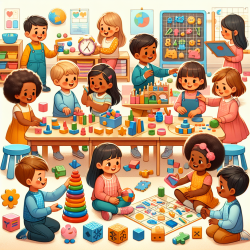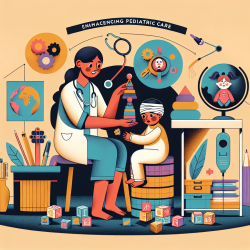As a speech-language pathologist (SLP) dedicated to creating optimal outcomes for children, understanding and implementing research-driven interventions is paramount. A recent study titled "Developmental kindergarten classroom intervention for spatial relational terms" provides valuable insights into enhancing children's comprehension of spatial terms within a classroom setting. This blog will delve into the findings of this study and offer practical applications for SLPs aiming to improve their intervention strategies.
The Importance of Spatial Relational Terms
Spatial relational terms, such as "above," "below," "left," and "right," are fundamental to language development and cognitive skills. These terms help children understand and describe the relationships between objects in their environment, which is crucial for both academic success and everyday communication. Research indicates that children who comprehend and use spatial terms perform better on spatial cognition tasks, such as spatial transformations and block design.
Study Overview
The study conducted by Eising and Karasinski evaluated a six-week classroom-based intervention targeting spatial terms in a developmental kindergarten classroom. The intervention included interactive book reading, visual aids, and hands-on activities designed to teach spatial terms. The study's participants were 15 five-year-old children from a rural school district, categorized into typically developing (TD) and lower language (LL) groups based on their language abilities.
Key Findings
- At post-test, more than half of the children who did not understand the targeted spatial terms at pre-test demonstrated understanding of the words "first," "front," "last," "behind," "center," "below," "under," and "right" by correctly identifying pictures representing these words.
- "Around" and "left" were the only two words learned by fewer than half of the children.
- The intervention was effective for both TD and LL children, although TD children showed slightly better outcomes.
Implications for Practitioners
These findings underscore the efficacy of classroom-based interventions for teaching spatial terms. SLPs can implement similar strategies within a Response to Intervention (RtI) or multi-tiered system of support (MTSS) framework to support language development in all students. Here are some practical steps for incorporating these findings into your practice:
- Interactive Book Reading: Use books that contain spatial terms and engage children with "wh" questions to enhance their understanding and prediction skills.
- Visual Aids: Introduce new spatial terms with printed pictures or illustrations and review previously learned terms to reinforce understanding.
- Hands-On Activities: Incorporate games and activities that require children to demonstrate spatial relationships, such as Simon Says or the Hokey Pokey.
Conclusion
Classroom-based language services that incorporate visual, verbal, and kinesthetic information can be highly beneficial for students with and without language deficits. Future research should explore the effectiveness of these interventions across different socioeconomic statuses and compare whole-class lessons to small-group or individual interventions.
To read the original research paper, please follow this link: Developmental kindergarten classroom intervention for spatial relational terms.










